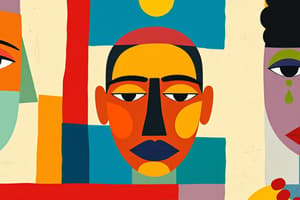Podcast
Questions and Answers
What is culture understood as in traditional societies?
What is culture understood as in traditional societies?
- A set of genetically transmitted traits
- A set of evolutionary principles
- A way of thinking unique to geographical locations
- Shared principles and social heritage that make up people's way of life (correct)
How is culture transmitted?
How is culture transmitted?
- Through written records
- Through socialization process (correct)
- Through verbal communication only
- Through genetic inheritance
What is a characteristic of culture?
What is a characteristic of culture?
- It is transmitted genetically
- It is only found in complex industrial societies
- It is unique to the human species (correct)
- It is universally constant
What serves as a guide for human action in a society?
What serves as a guide for human action in a society?
What is a result of new items being added to culture?
What is a result of new items being added to culture?
What is a characteristic of culture according to Ojetayo?
What is a characteristic of culture according to Ojetayo?
What is culture historically designed for?
What is culture historically designed for?
What is true about culture in relation to time?
What is true about culture in relation to time?
What is the origin of the term 'culture'?
What is the origin of the term 'culture'?
According to Nigerian National Cultural Policy (1988), what does culture encompass?
According to Nigerian National Cultural Policy (1988), what does culture encompass?
Who provided the classic definition of culture in 1871?
Who provided the classic definition of culture in 1871?
What is culture considered to be fundamental to?
What is culture considered to be fundamental to?
What is culture dynamic in?
What is culture dynamic in?
According to E.B. Tylor, what does culture include?
According to E.B. Tylor, what does culture include?
What is culture acquired through?
What is culture acquired through?
What is the significance of culture in human societies?
What is the significance of culture in human societies?
What is a norm in a society?
What is a norm in a society?
What are formal norms?
What are formal norms?
What is the purpose of sanctions in a society?
What is the purpose of sanctions in a society?
What are culture traits?
What are culture traits?
What can affect the prevalence of cultural traits in a society?
What can affect the prevalence of cultural traits in a society?
How are cultural traits transmitted from one generation to the next?
How are cultural traits transmitted from one generation to the next?
What is the relationship between values and sanctions in a society?
What is the relationship between values and sanctions in a society?
What can be said about culture?
What can be said about culture?
What is the primary reason why there is no natural connection between a symbol and what it represents?
What is the primary reason why there is no natural connection between a symbol and what it represents?
What is the main characteristic of culture that makes it different from technical or practical aspects of human behavior?
What is the main characteristic of culture that makes it different from technical or practical aspects of human behavior?
What does the statement "Culture is integrated" mean?
What does the statement "Culture is integrated" mean?
Which of the following is NOT considered a trait of a culture?
Which of the following is NOT considered a trait of a culture?
What is the main advantage of human adaptation through culture?
What is the main advantage of human adaptation through culture?
What is a potential drawback of cultural adaptation?
What is a potential drawback of cultural adaptation?
What is the main function of values in a culture?
What is the main function of values in a culture?
Why is it important to consider the interconnectedness of cultural elements when studying a culture?
Why is it important to consider the interconnectedness of cultural elements when studying a culture?
Why is culture considered epistemological?
Why is culture considered epistemological?
What is the primary motivation for creating and maintaining culture?
What is the primary motivation for creating and maintaining culture?
What is the relationship between 'bad' events and cultural understanding?
What is the relationship between 'bad' events and cultural understanding?
How does the text suggest that culture is a collaborative process?
How does the text suggest that culture is a collaborative process?
What is the key premise of the Knowledge-Based Affect Theory (KBAT)?
What is the key premise of the Knowledge-Based Affect Theory (KBAT)?
What are the three basic dimensions of cultural production according to Loren Demerath?
What are the three basic dimensions of cultural production according to Loren Demerath?
What are some potential applications of the sources of knowledge mentioned in the text?
What are some potential applications of the sources of knowledge mentioned in the text?
What is the relationship between culture and knowledge?
What is the relationship between culture and knowledge?
Flashcards are hidden until you start studying
Study Notes
Concept of Culture
- Culture has no universally acceptable definition
- Derived from Latin word "colere," meaning "to cultivate"
- Social behavior and norms found in human societies
- Central concept in anthropology, encompassing phenomena transmitted through social learning
- Considered fundamental to human existence and civilization
Definition of Culture
- Nigerian National Cultural Policy (1988): totality of way of life evolved by a people to meet environmental challenges
- E.B. Tylor (1871): complex whole including knowledge, belief, art, morals, law, customs, and capabilities acquired by man as a member of society
- Culture is shared principles, social heritage that make up a people's way of life
Characteristics of Culture
- Historically created and shared by all members of a society
- Not genetically transmitted, but learnt and transmitted through socialization process
- Universal, variable, and dynamic
- Unique to human species
- Has moral force, serving as a guide for human action
- Works in the symbolic domain, emphasizing meaning rather than technical or practical rational side of human behavior
- Integrated, with elements adjusted to or consistent with one another
Elements of Culture
- Types of norms
- Sanctions
- Values
- Culture trait
- Culture complex
- Culture pattern
Values
- What is considered good, proper, and desirable, or bad, improper, or undesirable, in a culture
- Influence people's behavior and serve as a benchmark for evaluating the actions of others
Norms
- Standard pattern of behavior accepted by a society
- May differ from society to society
- Formal norms: written down and violation can lead to punishment
- Informal norms: generally understood and followed by a society, but not recorded in black and white
Sanctions
- Consist of rewards and penalties
- Rewards for conducting norms, penalties for defying social norms
- Positive sanctions: medals, gratitude, or praise
- Negative sanctions: fines, threats, imprisonment, or unpleasant stares
Culture Traits
- Smallest units of a culture
- Building blocks of culture
- Can be material or non-material
- Have a form, use, function, and meaning
- Several traits form a complex culture
Epistemology and Cosmology
- Culture is epistemological, making human experience understandable
- Makes humans feel they know their world and places
- Enables humans to appreciate bad events if they illustrate a shared meaning
- The desire to know the environment motivates humans to create and maintain culture
Sources of Knowledge for Culture
- Traditional Knowledge
- Historical Knowledge
- Archaeological Knowledge
- Scientific Knowledge
- Local, National, and International Regulations
- Community Consultations
Cultural Production
- Three basic dimensions: articulate, typify, and orient
- Enables humans to create and maintain culture as knowledge of the world
- Knowledge-Based Affect Theory (KBAT) explains how individuals enhance their sense of security in the world by creating and maintaining culture.
Studying That Suits You
Use AI to generate personalized quizzes and flashcards to suit your learning preferences.




